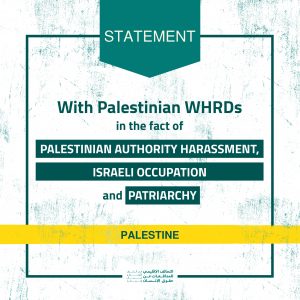With Palestinian WHRDs in the Face of Palestinian Authority Harassment, Israeli Occupation and Patriarchy
On Thursday, June 24, 2021, Palestinian Authority security forces arrested political analyst  Nizar Banat from his home based on an arrest warrant from the Public Prosecution. On the same day, Jibreen Al-Bakri, Governor of the Hebron District, announced the death of Banat due to the deterioration of his health. Banat’s family accused the Palestinian security forces of torturing and assassinating him. Investigations are still underway to determine how activist Nizar Banat was killed by the Palestinian Authority. This is not the first time that the Palestinian Authority has committed an assassination against human rights defenders.
Nizar Banat from his home based on an arrest warrant from the Public Prosecution. On the same day, Jibreen Al-Bakri, Governor of the Hebron District, announced the death of Banat due to the deterioration of his health. Banat’s family accused the Palestinian security forces of torturing and assassinating him. Investigations are still underway to determine how activist Nizar Banat was killed by the Palestinian Authority. This is not the first time that the Palestinian Authority has committed an assassination against human rights defenders.
The assassination of Nizar Banat created a state of public anger. It ignited areas of the West Bank with protest movements, specifically Ramallah, where youth, student, and feminist groups called for a sit-in in front of the Palestinian Authority’s presidential headquarters to demand justice for Nizar Banat his family. The demonstrations began on June 24, 2021, and hundreds of people took to the streets of Ramallah on Saturday, calling for Palestinian President Mahmoud Abbas to resign. The Palestinian Authority used excessive force against demonstrators, where it launched tear gas attacks targeting their faces. Among them, journalists such as Shatha Hammad, who was hit by a gas bomb in the face. Prominent female journalists and human rights defenders were mainly attacked, as reporter Najla Zaitoun was pushed and beaten and threatened with arrest. In addition, plainclothesmen attacked demonstrators and stole their phones, and according to the testimony of WHRD Dr. Yara Hawari. PA members verbally and physically harassed the women demonstrators. In this context, the Palestinian Journalists Syndicate condemned the security forces’ attacks on women journalists covering the demonstrations and called for a boycott of the Palestinian presidency and government news until the popular demands are met.
Attacking WHRDs, women demonstrators, and journalists in this way cannot be separated from a context that prevents women from participating in the public sphere and seeks to punish them for their presence in the streets and demand justice. The use of patriarchal tools such as sexual and verbal harassment against women demonstrators to intimidate them and keep them away from the public street cannot but be seen as a systematic patriarchal attempt to exclude women. The PA also has a notorious history of human rights abuse, particularly concerning human rights defenders. It was stated in the Human Rights Watch report finding that the PA has increasingly used a 1954 law that allows individuals to be held without charge or trial indefinitely by order of a governor. It also pursues a policy of suppressing dissenting voices.
Accordingly, the Regional Coalition of Women Human Rights Defenders expresses its concern about the excessive violence used by the Palestinian security forces, whether in civilian or military clothes. We recall the sensitivity and severity of the positionality of women human rights defenders in Palestine, who face the oppression of the Israeli occupation and the Palestinian Authority the context of a patriarchal society that demonizes women’s rights and activism in the public sphere. This violent attack on WHRDs, demonstrators, and journalists comes in a context preceded by a systematic defamation process against women’s organizations, especially those calling for the signing of CEDAW and the Family Protection Law from Violence.
In Palestine, WHRDs have to fight against patriarchal violence from their community, the Israeli occupation, and the Palestinian Authority. Therefore, it is necessary to understand the broader context of the recent violations to not be separated from a general case of the demonization of the WHRD movement in general and the Palestinian feminist movement in particular. The Coalition sees defamation and demonization as a process of fragmentation. These tactics aim at stripping women of the possibilities of building networks of protection, support, and solidarity. We also see them as obstructing and stopping work and forcing conditionality on the extent to which the type of work or field of work conforms to the established patriarchal standards. Therefore, the Coalition affirms and reiterates its absolute solidarity with women human rights defenders in Palestine and sees their multiple and intertwined struggles at all levels.
The WHRDMENA Coalition urgently calls for:
- Ending all forms of violations and attacks on WHRDs and demonstrators and ensuring the protection of women human rights defenders and their right to be in the public sphere
- A thorough, impartial, and prompt investigation of all testimonies of sexual and physical violence against women journalists and defenders.

